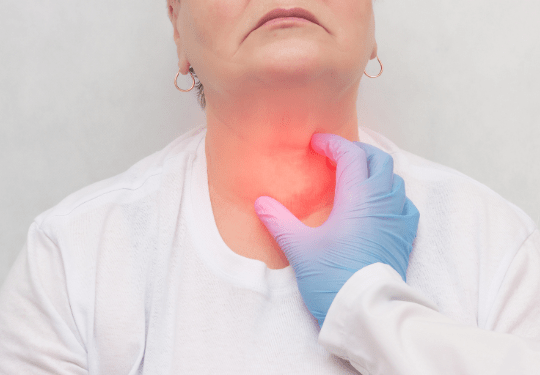What is Toxic Goiter?

Symptoms of Toxic Goiter
People with toxic goiter may experience:
- Unexplained weight loss despite good appetite
- Rapid or irregular heartbeat (palpitations)
- Nervousness, anxiety, or irritability
- Tremors in hands or fingers
- Increased sweating and heat intolerance
- Difficulty sleeping
- Muscle weakness
- Enlarged thyroid gland visible in the neck
- Shortness of breath (due to large goiter compressing nearby structures)
- Difficulty swallowing (if the goiter is large)
Procedure or Treatment for Toxic Goiter
Treatment options include:
1. Medications
Antithyroid drugs (e.g. Methimazole, Propylthiouracil) to reduce hormone production.
Beta-blockers to control symptoms like rapid heartbeat.
However, medications may not provide a permanent cure, especially in toxic nodular goiter.
2. Radioactive Iodine Therapy
Involves oral intake of radioactive iodine that destroys overactive thyroid tissue gradually.
Suitable for many patients but not recommended during pregnancy or severe compression symptoms.
3. Surgery (Thyroidectomy)
Surgery is often preferred when:
The goiter is large and causing compression symptoms (difficulty breathing or swallowing).
There is suspicion of cancer.
The patient prefers definitive treatment avoiding radioactive iodine.
Antithyroid drugs are ineffective or not tolerated.
Procedure
Subtotal thyroidectomy: Partial removal of the thyroid gland.
Total thyroidectomy: Complete removal of the thyroid gland, often preferred to reduce recurrence.
The surgery is done under general anaesthesia, involving an incision in the lower neck to remove the affected thyroid tissue. Hospital stay is generally 1-2 days with full recovery in a few weeks.
Prevention of Toxic Goiter
- Adequate iodine intake through diet or iodised salt to prevent simple goiter progressing to toxic goiter.
- Regular thyroid check-ups if you have a history of goiter.
- Prompt treatment of existing thyroid nodules to monitor their activity.
Benefits of Surgery for Toxic Goiter
- Permanent cure for hyperthyroidism caused by toxic goiter
- Relief from compression symptoms like difficulty in swallowing or breathing
- Eliminates the risk of malignant transformation within nodules
- Improves quality of life by stabilising thyroid hormone levels after appropriate replacement therapy if needed post-surgery
Types of Toxic Goiter
Toxic Multinodular Goiter (Plummer’s disease): Multiple nodules in the thyroid producing excess hormones.
Toxic Adenoma: Single overactive nodule in the thyroid gland.
Diffuse Toxic Goiter (Graves’ disease): Entire thyroid is overactive (though it differs in pathology, surgery approach is similar if needed).
